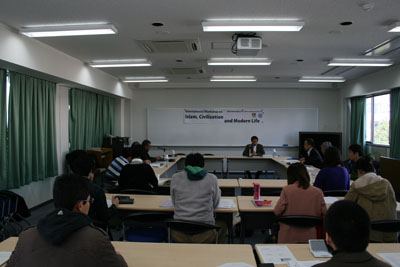
-
KIAS / 科研基盤(A)「環インド洋地域における宗教復興・テクノロジー・生命倫理」/ マレーシア国民大学イスラーム文明研究所共催国際WS
(2011年12月13日 於京都大学)
タイトル:"International Workshop on Islam, Civilization and Modern Life"
[Organizers]
Center for Islamic Area Studies at Kyoto University (KIAS)
Grant-in- Aid for Scientific Research (A) "Revival of Religion, Technology and Bioethics in the Indian Ocean Area"
Institute of Islam Hadhari at Universiti Kebangsaan Malaysia (The National University of Malaysia)
[Date and Venue]
10.00 - 18.30, 13 December 2011
Meeting Room (AA447), Research Building No. 2. 4th Floor, Yoshida Main Campus, Kyoto University.
[Program]
10.00-10.30: Opening Remarks
10.30-12.00: Morning Session
Keynote Speech 1
Prof. Dato' Dr. Yusof Hj. Othman (Universiti Kebangsaan Malaysia)
"Tauhidic Science: Why and What?"
Keynote Speech 2
Prof. KOSUGI Yasushi (Kyoto University)
"Asian Models of Modern Life in the Age of Globalization: From Japanese and Malaysian Perspectives"
13.00-18.00: Afternoon Session
Keynote 3
Prof. Dr. Abdul Latif Samian (Universiti Kebangsaan Malaysia)
"Tauhidic Mathematic"
Muhammad Hakimi bin Mohd Shafiai (Kyoto University)
"The Potential of Islamic Agricultural Finance in Malaysia"
KAWAMURA Ai (Kyoto University)
"The Modification of Legal System in the United Arab Emirates for Islamic Finance"
HAGIHARA Jun (Kyoto University)
"Economical Development of Saudi Arabia's Private Sector"
SUNAGA Emiko (Kyoto University)
"Translation, Adaptation and Indigenisation of Knowledge: An Introduction to Exegesis of the Qur'an in South Asian Languages"
CHIBA Yushi (Kyoto University)
"The Arab Media and New International; Information and Communication Order (NIICO: A Historical Review".
18.15-18.30: Closing Remarks


This International Workshop has been co-organized by the Center for Islamic Area Studies at Kyoto University (KIAS), Grant-in-Aid for Scientific Research (A) "Revival of Religion, Technology and Bioethics in the Indian Ocean Area" and the Institute of Islam Hadhari at Universiti Kebangsaan Malaysia (The National University of Malaysia).
There are three Key Note Speech delivered by Prof. Dato Dr. Yusof Hj. Othman on the title of "Tauhidic Science: Why and What?", Prof. KOSUGI Yasushi with "Asian Models of Modern Life in the Age of Globalization: From Japanese and Malaysian Perspectives" and Prof. Dr. Abdul Latif Samian on the title "Tauhidic Mathematic".
As for the first key note by Prof. Yusof on Tauhidic Science, he emphasized on the need of science which is not only responsible to human being and environment, but also to God and, accordingly, he highlighted the concept of Tauhidic Science based on the Quran and Hadith. At the end of his speech, the terms 'science without religion is bind; religion without science is flaw' has been underlined by him.
For the second key note by Prof. Kosugi Yasushi, the presentation was on the views of Japanese and Malaysian as the representatives of Asian models of modern life in the age of globalization. Therefore, according to Prof Kosugi, it can be said that a need of new civilizational fusion toward a global civilization.
The last key note speech by Prof. Abdul Latif can be regarded in sequence with the first key note which is on the Tauhidic Mathematic. Realizing of the role of man in the earth as the problem solver, he has suggested that the problem faced by human being can be solved by using Tauhidic Mathematic by way of arithmetic and geometric based on the argument the mathematical problems is also the religious problems.
Meanwhile, five PhD candidates from Kyoto University also did their presentation during the International Workshop. Muhammad Hakimi Bin Mohd Shafiai has presented his research on the potential of Islamic agricultural finance to be implemented mainly in Malaysia. His proposal of "Agricultural Product and Loss Sharing" (aPLS) can be considered as an alternative to the conventional system theoretically and, based on the fieldwork; the implementation in Malaysia is promising.
In addition, Kawamura Ai has made a presentation on the modification of legal system in the United Arab Emirates (UAE) for Islamic finance. This is due to the regulation for Islamic finance in the UAE is not defined clearly in the specific law rather than in the general term in the Federal Law. As a result, alternative solution methods for disputes are necessary like Special Judicial Committee and Arbitration.
Furthermore, Hagihara Jun examined the progress of economic development of Saudi Arabia's private sector since Saudi Arabia has gathered wealth by exporting oil and petrochemical. He also mentioned that Saudi Arabia aimed to modernize living in 1973 to 1980s through improvement of social service, income rise and education.
Moreover, Sunaga Emiko presented a presentation on the translation, adaptation and indigenization of knowledge particularly on the exegesis of the Qur'an in South Asian languages. She also did a comparison between a tafsir of Arabic language and Urdu and picked up the Tafsir of Maududi (Tafhim al-Quran) as an example. It can be argued that the Urdu is the key language in order to understand the Quran for the people in the South Asian.
The last presenter, Yushi Chiba had analyzed a historical review on the Arab media and the new International Information and Communication Order (NIICO). The presenter has concluded that the internal political tension among Arab states has been identified as one of major problems for the international information and communication problems especially during the 1970s and 1980s.
All the presentations by PhD students have been commented mainly by two Professors from the National University of Malaysia; Prof. Dr. Yusof and Prof. Abdul Latif as well as from the floor. In short, from all presentations, it can be considered that this International workshop has met the theme of the symposium which is on Islam, Civilization and Modern Life.
報告者:Muhammad Hakimi bin Mohd Shafiai(京都大学大学院アジア・アフリカ地域研究研究科)


















